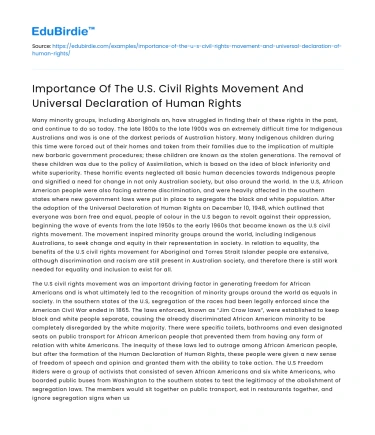Many minority groups, including Aboriginals an, have struggled in finding their of these rights in the past, and continue to do so today. The late 1800s to the late 1900s was an extremely difficult time for Indigenous Australians and was is one of the darkest periods of Australian history. Many Indigenous children during this time were forced out of their homes and taken from their families due to the implication of multiple new barbaric government procedures; these children are known as the stolen generations. The removal of these children was due to the policy of Assimilation, which is based on the idea of black inferiority and white superiority. These horrific events neglected all basic human decencies towards Indigenous people and signified a need for change in not only Australian society, but also around the world. In the U.S, African American people were also facing extreme discrimination, and were heavily affected in the southern states where new government laws were put in place to segregate the black and white population. After the adoption of the Universal Declaration of Human Rights on December 10, 1948, which outlined that everyone was born free and equal, people of colour in the U.S began to revolt against their oppression, beginning the wave of events from the late 1950s to the early 1960s that became known as the U.S civil rights movement. The movement inspired minority groups around the world, including Indigenous Australians, to seek change and equity in their representation in society. In relation to equality, the benefits of the U.S civil rights movement for Aboriginal and Torres Strait Islander people are extensive, although discrimination and racism are still present in Australian society, and therefore there is still work needed for equality and inclusion to exist for all.
The U.S civil rights movement was an important driving factor in generating freedom for African Americans and is what ultimately led to the recognition of minority groups around the world as equals in society. In the southern states of the U.S, segregation of the races had been legally enforced since the American Civil War ended in 1865. The laws enforced, known as “Jim Crow laws”, were established to keep black and white people separate, causing the already discriminated African American minority to be completely disregarded by the white majority. There were specific toilets, bathrooms and even designated seats on public transport for African American people that prevented them from having any form of relation with white Americans. The inequity of these laws led to outrage among African American people, but after the formation of the Human Declaration of Human Rights, these people were given a new sense of freedom of speech and opinion and granted them with the ability to take action. The U.S Freedom Riders were a group of activists that consisted of seven African Americans and six white Americans, who boarded public buses from Washington to the southern states to test the legitimacy of the abolishment of segregation laws. The members would sit together on public transport, eat in restaurants together, and ignore segregation signs when using toilets and drinking fountains. As defiant as they were, the riders were not exempt from violence, facing much protest from racist white Americans, often resulting in serious injury. This aggression, if nothing else, was motivation for many other Freedom Riders to join the campaign in 1961. The actions of these ordinary people helped to make leaders such as Dr Martin Luther King seen by the media and public eye, which consequently is what secured enough attention to the movement that King was able to lead his march in August 1963 which consisted of over 250 000 people into Washington, where he gave his infamous “I have a dream” speech. On 2 July 1964, the U.S Congress approved the Civil Rights Act, which outlawed discrimination based on race or gender, a ground-breaking achievement for the movement and the people involved. These individuals were significant in providing a stance for African American people and acted as a turning point for race equality in the U.S, but divergence still existed withing the citizens of America.
Save your time!
We can take care of your essay
- Proper editing and formatting
- Free revision, title page, and bibliography
- Flexible prices and money-back guarantee






 Stuck on your essay?
Stuck on your essay?

